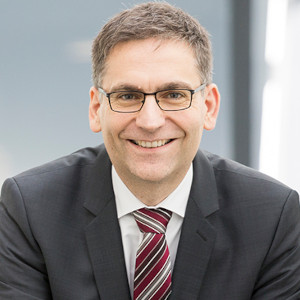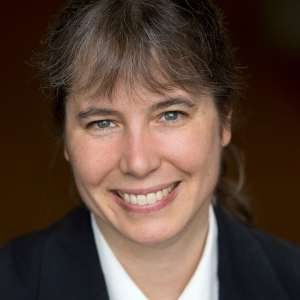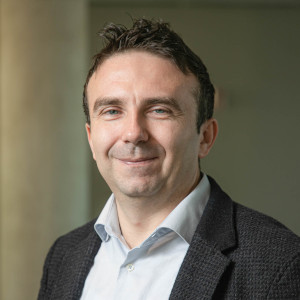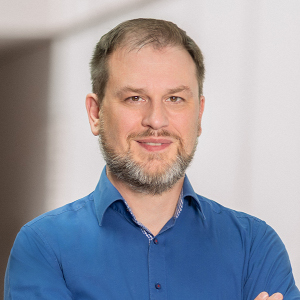
Fraunhofer Institute for Cognitive Systems IKS
Prof. Mario Trapp is Executive Director of the Fraunhofer Institute for Cognitive Systems IKS. In 2005, he obtained his PhD from TU Kaisers-lautern, where he also did his habilitation in 2016. He also joined Fraunhofer IESE in 2005, where he started off as a head of department in safety-critical software before becoming head of the Embedded Systems division from 2009 to 2017. After being appointed Acting Executive Director of Fraunhofer ESK (now Fraunhofer IKS) in Munich on January 1, 2018, he assumed this role on a permanent basis on May 1, 2019. In addition to this, Mario Trapp has been a Full Professor at the Technical University of Munich (TUM) since June 1, 2022. He is the Resident Professor for Engineering Resilient Cognitive Systems at the School of Computation, Information and Technology CIT. Prior to this, he taught as an Adjunct Professor in the Department of Computer Science at the TU Kaiserslautern.
For many years, Mario Trapp has been contributing his expertise to the development of innovative embedded systems in the context of successful partner projects, in cooperation with both leading international corporations and small and medium-sized enterprises. Currently, his personal research focus is safety assurance and resilience for cognitive systems, which form the technological basis of many future scenarios such as Industrie 4.0 and automated driving. Mario Trapp has authored numerous international scientific publications. He is also a member of the Bavarian State Government’s Council on AI (Bayerischen KI-Rat) and the Bavarian State Ministry of Economic Affairs, Regional Development and Energy’s AI — Data Science (KI — Data Science) expert panel.
Keynote Title: Artificial Stupidity and Its Strategic Value
Abstract: In an era where Artificial Intelligence is hailed as the cornerstone of innovation, promising transformative and seemingly magical solutions, there exists a parallel narrative of concern and skepticism. This talk navigates the complex landscape between utopian excitement and dystopian fear, seeking the truth that lies in between. This presentation addresses both the perceived and real challenges of AI, with a particular focus on physical AI systems. It explores the fundamental difficulties in assuring AI quality and examines why achieving safe AI will remain an illusion. Crucially, it explains why these quality limitations are not barriers to progress - contrary to current narratives - but rather present a unique opportunity for German industry. Central to the discussion is the introduction of a "triarchic intelligence" framework - an innovative approach that enables us to harness the transformative potential of physical AI while maintaining acceptable risk. This talk provides practical insights into how we can move forward with AI by acknowledging its limitations and building systems that account for them, turning potential weaknesses into strategic advantages.

Ludwig-Maximilians-Universität München
Gitta Kutyniok currently has a Bavarian AI Chair for Mathematical Foundations of Artificial Intelligence at the Ludwig-Maximilians-Universität München, and is in addition affiliated with the DLR-German Aerospace Center and the University of Tromso. She received her Diploma in Mathematics and Computer Science as well as her Ph.D. degree from the Universität Paderborn in Germany, and her Habilitation in Mathematics in 2006 at the Justus-Liebig Universität Gießen. From 2001 to 2008 she held visiting positions at several US institutions, including Princeton University, Stanford University, Yale University, Georgia Institute of Technology, and Washington University in St. Louis. In 2008, she became a full professor of mathematics at the Universität Osnabrück, and moved to Berlin three years later, where she held an Einstein Chair in the Institute of Mathematics at the Technische Universität Berlin and a courtesy appointment in the Department of Computer Science and Engineering until 2020. In 2023, together with colleagues she founded the start-up EcoLogic Computing GmbH.
Gitta Kutyniok has received various awards for her research such as an award from the Universität Paderborn in 2003, the Research Prize of the Justus-Liebig Universität Gießen and a Heisenberg-Fellowship in 2006, and the von Kaven Prize by the DFG in 2007. She was invited as the Noether Lecturer at the ÖMG-DMV Congress in 2013, a plenary lecturer at the 8th European Congress of Mathematics (8ECM) in 2021, and the lecturer of the London Mathematical Society (LMS) Invited Lecture Series in 2022. She was also honored by invited lectures at both the International Congress of Mathematicians 2022 (ICM 2022) and the International Congress on Industrial and Applied Mathematics (ICIAM 2023). Moreover, she was elected as a member of the Berlin-Brandenburg Academy of Sciences and Humanities in 2017 and of the European Academy of Sciences in 2022, became a SIAM Fellow in 2019 and an IEEE Fellow in 2024, and served as Vice President-at-Large of SIAM from 2021 to 2023. She currently acts as LMU-Director of the Konrad Zuse School of Excellence in Reliable AI (relAI) in Munich. In addition, she is initiator and spokesperson of the DFG-Priority Program "Theoretical Foundations of Deep Learning" and of the AI-HUB@LMU, which is the interdisciplinary platform for research, teaching, and transfer in AI at LMU.
Gitta Kutyniok's research work covers, in particular, the areas of applied and computational harmonic analysis, artificial intelligence, compressed sensing, deep learning, imaging sciences, inverse problems, and applications to life sciences, robotics, and telecommunication.
Keynote Title: Trustworthy & Sustainable AI: Powering the Future with Next-Generation Computing
Abstract: Artificial intelligence is transforming industry, society, and science at an unprecedented pace. Yet its future depends on solving two pressing challenges: trustworthiness and sustainability. In this lecture, we will examine these obstacles from a foundational perspective, uncovering their root causes and highlighting the limits of current computing architectures. This perspective points to the need for rethinking hardware design and embracing novel paradigms such as analog computing, paving the way toward AI systems that are not only powerful but also reliable and energy-efficient.

Technical University of Berlin
Wojciech Samek is a Professor in the EECS Department at the Technical University of Berlin and the Head of the AI Department at the Fraunhofer Heinrich Hertz Institute (HHI) in Berlin, Germany. He earned a Dipl-Inf. degree in Computer Science from Humboldt University of Berlin in 2010 and a Ph.D. (with honors) from the Technical University of Berlin in 2014. Following his doctorate, he founded the "Machine Learning" Group at Fraunhofer HHI, which became an independent department in 2021. He is a Fellow at BIFOLD – the Berlin Institute for the Foundation of Learning and Data and the ELLIS Unit Berlin. He also serves as a member of Germany’s Platform for AI and sits on the boards of AGH University’s AI Center, the Helmholtz Einstein School in Data Science (HEIBRiDS), and the DAAD Konrad Zuse School ELIZA. Dr. Samek’s research in explainable AI (XAI) spans method development, theory, and applications, with pioneering contributions such as Layer-wise Relevance Propagation (LRP), advancements in concept-level explainability, evaluation of explanations, and XAI-driven model and data improvement. He has served as a senior editor for IEEE TNNLS, held associate editor roles for various other journals, and acted as an area chair at NeurIPS, ICML, and NAACL. He has received several best paper awards, including from Pattern Recognition (2020), Digital Signal Processing (2022), and the IEEE Signal Processing Society (2025). Overall, he has co-authored more than 250 peer-reviewed journal and conference papers, with several recognized as ESI Hot Papers or Highly Cited Papers.
Keynote Title: Hallucinations, Explanations, and Insights: Challenges of Understanding AI in the LLM Era
Abstract: Traditional engineered systems -such as an airplane’s wing or a bridge’s foundation- are built from modular, transparent components, each with a well-defined and independently verifiable function. In contrast, modern AI models are developed end-to-end through data-driven optimization. While this often yields powerful capabilities, it also produces opaque systems whose internal logic is difficult to interpret or validate. This talk introduces new methods that bring engineering-style inspection to AI models, enabling a deeper understanding of their internal representations and behaviors. In large language models, for example, we can identify specialized attention heads: in-context heads, which interpret instructions and retrieve relevant contextual information through retrieval-augmentation, and parametric heads, which encode relational knowledge about entities. This fine-grained insight not only illuminates how LLMs reason but also supports practical tools for detecting and mitigating hallucinations, advancing the development of safer and more transparent AI.

Technical University of Munich (TUM)
Stefan Wagner is a full professor of software engineering at the Technical University of Munich (TUM), where he earned his doctoral degree in computer science. With a background in computer science and psychology, he has published over 130 peer-reviewed scientific articles and authored the book "Software Product Quality Control." His research interests span several areas of software engineering, including software quality, human factors, AI-based software engineering, automotive software, AI-based systems, and empirical studies. Dr. Wagner serves on the editorial boards of IEEE Software, Empirical Software Engineering, and the Journal of Systems and Software. He used to be a Section Editor of PeerJ Computer Science. He has received numerous best paper awards and was recognized as a 2022 Class of IEEE Computer Society Distinguished Contributor. Dr. Wagner is a member of the German GI and a senior member of ACM and IEEE.
Keynote Title: AI-Supported Software Engineering: Beyond Code
Abstract: Artificial intelligence is revolutionizing various domains and disciplines, with software engineering being one of the most significantly impacted areas. While there’s a lot of focus on large language models (LLMs) generating code, it’s important to recognize that building software involves far more than just code generation. In this talk, we delve into the activities of requirements engineering and software architecture design. Although we’re still exploring the potential of LLMs in software engineering, we can demonstrate their usefulness in creating and working with well-structured requirements. Additionally, LLMs show promising results in generating diagrams for architecture design. However, we also acknowledge that a structured approach and the seamless integration of human expertise in the loop are essential to achieve optimal results. Therefore, we’ll discuss the potential benefits and current limitations of AI-supported software engineering.